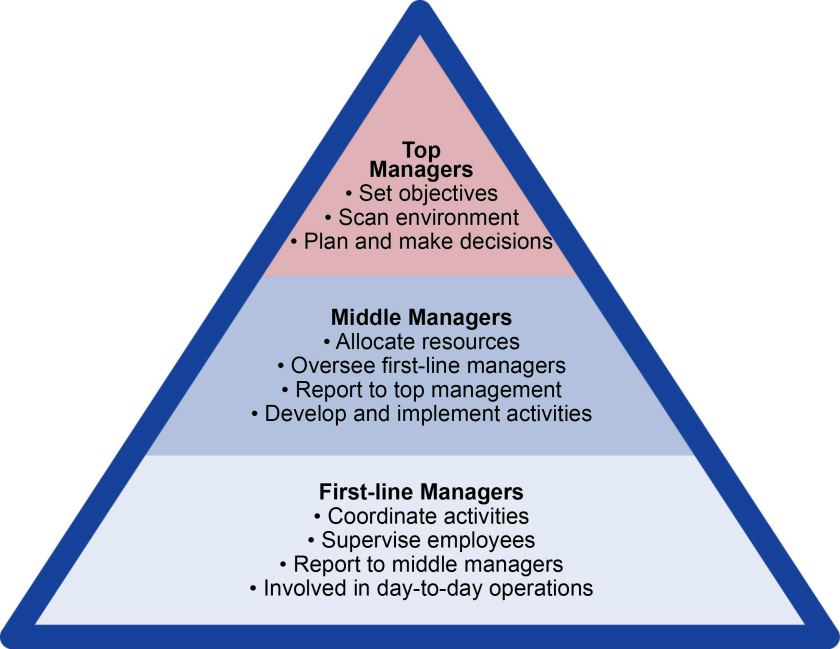The compilation of these Nature and Significance of Management Notes makes students exam preparation simpler and organised.
Levels and Functions of Management
We have already seen how important management is to an organization. In management to there are levels depending on seniority and experience levels as well as ability. Let us take a look at the levels of management and some important functions of management.
Levels of Management
Management is a generalised term which essentially means taking care of the processes within an organisation in order to ensure its effective functioning. Technically, management is a process of getting things done with the aim of achieving goals effectively and efficiently. Obviously, if one person is asked to manage a whole organisation, it would prove to be too herculean of a task.
Evidently, the workload of management is divided into a hierarchy. Each person in the hierarchy is provided with just enough amount of authority and responsibility. Definitely, as we move up the hierarchy the authority and responsibility (and the salary too!) seems to increase.
This hierarchy gives rise to an authority-responsibility relationship between individuals which gives rise to various levels of management, which further introduces superiors and subordinates (due to the difference in authority and responsibility) into the management system. These levels are studied as under:
Top Management
The top managers are the masterminds of all organizational policies. They are responsible for heading and putting forth the plans and ideas to ensure the welfare of the whole organisation. Further, they are responsible for all activities and their implications for society.
In fact, they are required to handle diverse elements and coordinate the activities of various departments to ensure that they always stay in line with the company’s objective. Generally, top officials like the chief executive officer, chief operating officer, president, etc. constitute the top managers. It involves a lot of workload and commitment towards the organisation.
Middle Management
The main task of middle managers is to carry out plans which are the brainchild of top managers. Additionally, they are responsible for extracting work productivity out of first-line managers. This means that middle managers are subordinate to top managers and superior to first-line managers. Division heads, plant superintendents, and operations managers qualify as middle managers.
They are responsible for the proper implementation of plans laid out by the top managers. Also, they are required to ensure the proper functioning of their department by assigning duties, ensuring that their department has proper personnel, motivating their subordinates, and cooperating with other departments for smooth functioning of the organisation.

Supervisory or Operational Management
Operational managers are at the bottom of the hierarchy. However, they rightly are important for a firm root of the management system. This is because they directly interact with the workforce. Their job is to supervise the workforce and communicate the objectives.
Through their efforts quality of output is maintained, wastage of materials is minimised and safety standards are maintained. Further, the quality of the output depends on the loyalty, discipline, and commitment of the workforce.
Functions of Management
Planning
Planning is the very first function of management. Management helps in deciding the way ahead for any organisation. It involves deeply analysing the market trends and accordingly making moves and plans. Basically, it means setting goals and developing a method to achieve them efficiently.
That being said, planning cannot prevent problems but it can definitely provide a way to deal with things when they go out of hand. For example, when principles of management are applied for a company selling a product, they help in planning the quantities of the product, type of product, methods of producing, etc. in order to perform well in the market and avoid losses.
Organising
Once a plan is laid out, its proper implementation lies somewhat in the next functions of management. This function helps in establishing authority, dividing workloads, assigning responsibilities, grouping tasks, and allocating resources.
The tasks are divided into various departments and resources required for the completion of tasks are distributed. Organising involves the grouping of the required tasks into manageable departments or work units and the establishment of authority and reporting relationships within the organisational hierarchy.
Staffing
This simply means finding and building the appropriate staff. Until and unless the right people aren’t employed the correct completion of tasks will remain a distant dream. Hence this management function ensures that suitable staff is available when needed by the organisation for the completion of tasks. Also known as the human resource function, it involves recruitment, placement, selection, and training.
Directing
This functions of management involve guiding the team towards the right direction by leading. motivating and encouraging them. Working in a positive environment of motivation and encouragement brings out the best in people. Hence a good manager makes sure to encourage or criticise his/her subordinates at suitable times to maintain an atmosphere of willingness to work.
Controlling
Finally, a manager needs to ensure that standards are being met by the company. The controlling function involves setting up performance standards, measuring performances, and comparing them to the established standards. Every good organisation sets a benchmark for performance which is required to be fulfilled. It is a managerial function to keep this in check.
Further, it is the duty of a manager to take appropriate steps when such standards are not met. Lastly, the management decides the actions which play a significant role in success, how and where they can be measured, and who should have the authority to take corrective actions.
Example:
Question:
______ is the process of using the resources and personnel of an organization in an orderly way to achieve the objective and long-term goals of the organization.
a. Planning
b. Organizing
c. Controlling
d. All of the above
Answer:
The correct answer is “b”.
Organising is the effective implementation of the plans made in the Planning function.